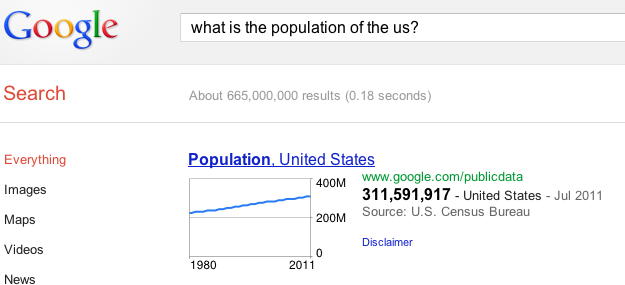Imagine being able to go to Google and typing, “List software developers within 25 miles of Mountain View, CA” and instead of a host of links, most of which won’t get you anywhere close to what you want, you instead get a list of software developers, along with links to the corresponding source?
Last week, the Wall Street Journal reported that Google is planning on making more changes to the way it processes searches and the biggest one could be using Google’s considerable processing power to get better, more relationally relevant results without having to hand scour dozens of resources.
Could this add another tool to the arsenal of sourcers and researchers? It depends on how much is hype and how much is reality.
Searching millions of “entities”
If anyone has an abundance of data that could make real semantic search an attractive possibility, it would be Google. With so much of the web indexed and data collected, it is a question of how much natural language and relationships they can build into search. And if the WSJ piece is on target, they could be looking at it more seriously than ever:
Google isn’t replacing its current keyword-search system, which determines the importance of a website based on the words it contains, how often other sites link to it, and dozens of other measures. Rather, the company is aiming to provide more relevant results by incorporating technology called “semantic search,” which refers to the process of understanding the actual meaning of words.
Amit Singhal, a top Google search executive, said in a recent interview that the search engine will better match search queries with a database containing hundreds of millions of “entities”—people, places and things—which the company has quietly amassed in the past two years. Semantic search can help associate different words with one another, such as a company (Google) with its founders (Larry Page and Sergey Brin).
Look at that last sentence. If Google can relationally determine a founder of a company simply based on semantic association, why couldn’t it be expanded to other positions within a company (or even relating to an industry or geography)?
A look at semantic search right now
Of course, Google does have some limited semantic search capabilities right now. I know I often use my search bar to make basic math calculations. And they’ve added other functionality over the years, such as displaying information like this when you search for the population of the US:

In response to the WSJ article, Danny Sullivan from Search Engine Land had this to say:
My take is that Google’s pushing these technologies for some good PR, and they are in turn being blown up out of proportion to what will really happen.
Google’s been under intense pressure in some quarters since rolling out Search Plus Your World, pressure that its results aren’t as good as in the past. It’s helpful to counter that type of bad PR with interviews talking up forward-looking technologies. Heck, it’s right out of Bing’s playbook.
And he even quotes from Singhal himself:
But as I explained in an interview last month, our initial steps towards this virtuous cycle are indeed baby steps. So stay tuned for updates on what will continue to be a long road ahead.
Sullivan seems skeptical that this is even news or that it will progress and I share in some of that as well. But even if the progress is slow going, this could be a big change.
Knowledge graph and improving intelligent search
The interview Singhal mentions is a fascinating one from last month on Mashable where he explains where Google search is going. From the current use of some complex keyword associations (and some nifty built-in tools that sourcers and researchers use on a daily basis) to a full on “understanding” of what you’re actually looking for, knowledge graph is the next logical step in the process.
Of course, what Google will need to do is go beyond what is available now. Everything from Apple’s Siri to WolframAlpha is seen as a competitor in the realm of intelligent search and other products (both specific to recruiting and not) utilize semantic capabilities already. If Google wants to stave off competitors to stay dominant, it needs to use its current position to improve the search engine beyond its current level. Whether this latest move is more hype than action, eventually Google will have to make a move in that direction.
